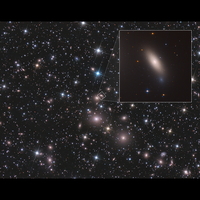Astronomers have put NASA’s Hubble Space Telescope on an Indiana Jones-type quest to uncover an ancient “relic galaxy” in our own cosmic backyard.

The very rare and odd assemblage of stars has remained essentially unchanged for the past 10 billion years. This wayward stellar island provides valuable new insights into the origin and evolution of galaxies billions of years ago.
The galaxy, NGC 1277, started its life with a bang long ago, ferociously churning out stars 1,000 times faster than seen in our own Milky Way today. But it abruptly went quiescent as the baby boomer stars aged and grew ever redder.
The findings are being published online in the March 12 issue of the science journal Nature.
See: http://hubblesite.org/news_release/news/2018-17

